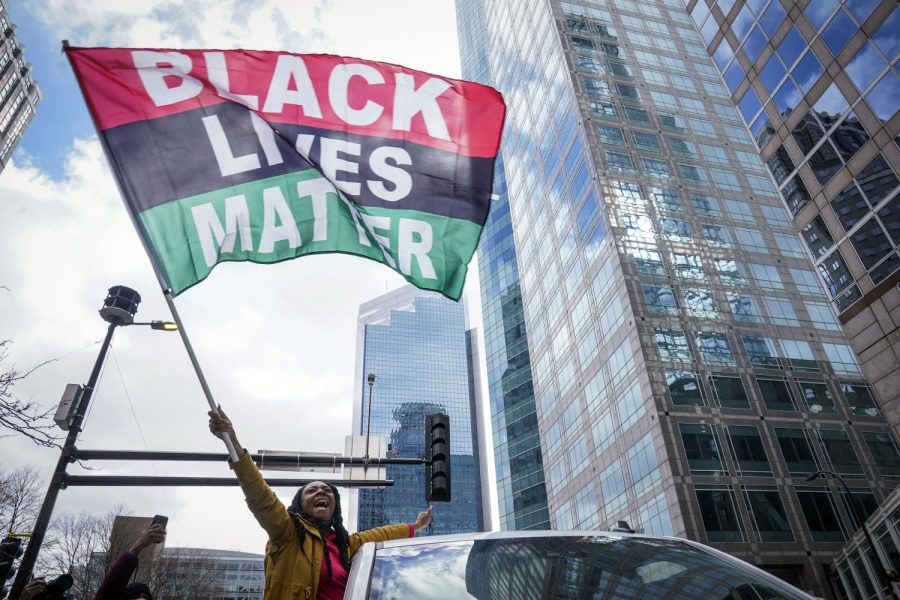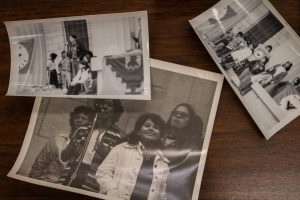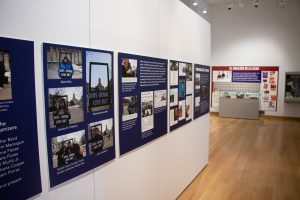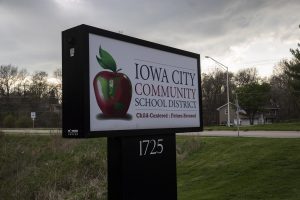Local leaders urge continued action after guilty verdict in Chauvin trial
After a jury found former Minneapolis police officer Derek Chauvin guilty in the murder of George Floyd, local leaders said it is not the end to the fight against police violence and systemic racism.
April 20, 2021; Minneapolis, Minnesota, USA; Crowds celebrate in the streets outside of the Hennepin Government Center as Derek Chauvin was found guilty of second-degree murder, third-degree murder and second-degree manslaughter in the death of George Floyd. Floyd died on May 25, 2020 while in police custody. A video showing Derek Chauvin kneeling on George Floyd’s neck sparked world wide protests against police brutality.
April 20, 2021
Campus and Iowa City leaders and activists reiterated the need for continued action on Tuesday after former Minneapolis police officer Derek Chauvin was found guilty on three charges in the murder of George Floyd.
Iowa City Mayor Bruce Teague opened Tuesday’s city council meeting by saying he supports the verdict and noted moves the Iowa City City Council has made regarding police reform and the city’s preliminary police plan.
“While these incidents may be hundreds of miles away from Iowa City, we must reflect and learn from these painful situations,” Teague said. “We know the public expects better here in Iowa City and we know the people who served on the Iowa City Police Department expect better of themselves as well.”
After about 10 hours of deliberation on Tuesday, a jury found Chauvin guilty of second-degree murder, third-degree murder, and second-degree manslaughter for the killing of Floyd, a Black man who died on May 25, 2020 after Chauvin knelt on his neck for several minutes.
Floyd’s death sparked one of the largest civil rights movements in decades with protests across the country renewing calls to end police violence, including in Iowa City. In response to demands from the Iowa Freedom Riders, an activism group formed over the summer, the City Council passed a 17-point resolution which included drafting a preliminary plan to restructure the Iowa City police, which was unveiled in December 2020.
“Today’s verdict does not provide us with a sense of peace or comfort, but does bring us together in our time of grief to become a stronger community, and one that understands the need for change,” Teague said.
Mohamed Traore, the chair of Iowa City’s Truth and Reconciliation Commission, said in an interview with The Daily Iowan Tuesday that the experience of watching Chauvin’s trial was similar to watching past cases of police shootings of Black Americans — such as George Zimmerman, who shot 17-year-old Trayvon Martin in 2012 and was found not guilty, and Darren Wilson, who killed Michael Brown in Ferguson, Missouri, but no charges were brought against him.
“It’s hard to say I feel good because I can’t really say it was justice,” Traore said. “The reason I say that is that justice is defined as equal and fair outcomes, and I don’t see the equality and fairness in George Floyd not being with his family and not being with his community.”
The verdict shows the need to continue pushing for change in local governments and institutions, Traore said. He said activists should continue to organize and hold local leaders accountable for pledged changes for social justice.
Traore chairs the Truth and Reconciliation Commission, a city board created last fall for the purpose of exposing instances of racial injustice in Iowa City and addressing inequality. The commission recently resumed last Thursday after it was paused by the Iowa City City Council.
“Something that we can all do is to continue striving forward to be better for ourselves and each other, and to actually continue pushing for truth, accountability, and justice and listen to people,” he said.
Amel Ali, the vice chair of the Truth and Reconciliation Commission, said she also doesn’t think justice has been served. She said as a prison abolitionist, she doesn’t think putting Chauvin in prison will bring fundamental changes.
“Putting Derek Chauvin in jail isn’t going to do anything,” she said. “Police officers are still killing people of color disproportionately. We’ve seen it happen while the trial is literally going on.”
In a campus email on Tuesday, Executive Officer for Diversity, Equity, and Inclusion Liz Tovar pointed to resources for students to meet, discuss, and process the trial and the verdict.
“Today’s verdict finding Derek Chauvin of the Minneapolis Police Department guilty for George Floyd’s death reminds us of the anger, sadness, and fear felt by our community during the last year,” Tovar wrote.
Tovar also pointed to University Counseling Services, the campus inclusion team, and other resources for students to turn to if needed.
In another email to the College of Liberal Arts and Sciences, Dean Sara Sanders encouraged students and others to ask difficult questions and confront issues of racism in their own lives. She said the verdict is not the end of systemic racism in the U.S.
“Today is one step in building a more inclusive society, as we saw justice for George Floyd and his family,” she wrote. “This has been a painful year, a traumatizing year, as we once again were faced with our complex history of violence against communities of color in the United States. But let’s not be naïve. One trial alone does not mean our society’s confrontation of systemic racism is over.”






